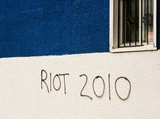
2010-06-26
Lawyers to assist demonstrators expected to be arrested for following legal advice that is no longer accurate
Kirk Makin
Lawyers and civil libertarians are scrambling to set up emergency legal help for a deluge of G20 protesters expected to be arrested over the weekend for heeding legal advice that is no longer accurate.
Experts sympathetic to their cause say protest groups had no inkling the police would be granted sweeping new powers to detain, search and arrest them. They said that by asserting what they believe to be their rights, the protesters are walking straight into a legal trap.
“The risk is that people are misinformed now,” said Nathalie Des Rosier, general counsel of the Canadian Civil Liberties Association. “Police never mentioned their intention to use these powers. Certainly, it was manipulative. And that’s wrong.”

The Law Union of Ontario and the CCLA have more than 150 lawyers on a list of volunteers standing by to deal with bail hearings and other legal emergencies. Some are patrolling demonstrations as monitors to observe civil-rights violations and help file official complaints over mistreatment.
The issue of civil liberties was a fuse waiting to be lit – and the exposure of the secret plan to clamp down on demonstrators, discovered Thursday by the CCLA, was all it took. Embedded within a 1939 law known as the Public Works Protection Act, it places a special designation on the perimeters of the summit security wall. The provision allows police to search without a warrant, demand identification and deny entry.
Criminal Lawyers Association president Paul Burstein said the measure “smacks of the War Measures Act. Do law enforcement agencies get excused from the normal constitutional requirements for interfering with citizens’ liberty depending on threats that may not materialize?”
Police were not backing away on Friday. “Unfortunately we have heard from a number of individuals who are, frankly, coming and saying that they are going to come here and wreck the place,” Toronto Police Chief Bill Blair told reporters. “I have a responsibility to protect the city.”
Chief Blair said that anyone approaching the fence who “seeks entry” still has the right to refuse to identify themselves or to refuse to be searched. But if they are asked to leave and then refuse, they could be arrested.
Grant Wilson, president of the Canadian Children’s Rights Council, criticized the police for making no provision to treat children separately. “The police have not stated that children and anyone taking care of them will be detained in separate facilities and the procedures they will use in relation to children near the fences or who can’t produce ‘adult ID,’ ” he said.
“No campaign has been put in place in schools or elsewhere to educate children and their parents about the sudden arrest authority to be used by the Toronto Police Service.”
Ms. Des Rosiers said lawyers have witnessed police conducting unlawful searches on protesters who are visibly intimidated. One of them involved a young black man who was surrounded by nine officers and told to open his backpack. “They were saying that they are searching everybody who goes to protest with a backpack,” Ms. Des Rosier said. “That is incorrect law.
“The kid opened it, was pushed aside and patted down, and removed his hoodie and shirt. This level of intimidation could either provoke more violence or anger, or provoke a sense of despondency over the loss of rights.”
To help those in detention, volunteer lawyers have studied case law on civil disobedience and public mischief in anticipation of their bail hearings, said Toronto lawyer Ryan Clements.
Mr. Clements said that anyone detained in a mass arrest has a good chance of obtaining bail, since the Crown’s case against a particular individual is likely to be weak.
Some lawyers believe that those arrested under the new provision can successfully argue that their Charter rights were curtailed by the sudden expansion of police power – making it a rare instance in which ignorance of the law is an actual defence.
Elsewhere on Friday, a Toronto judge said Toronto Police must abide by certain restrictions if they use sound cannons during the G20 summit. Mr. Justice D.M. Brown of Ontario Superior Court said officers can use the voice function of Long-Range Acoustical Devices, but not the ear-piercing alert function.
The CCLA sought an injunction against the use of the devices after learning that Toronto Police had obtained four of them prior to the summit. Critics fear they can cause ear damage.